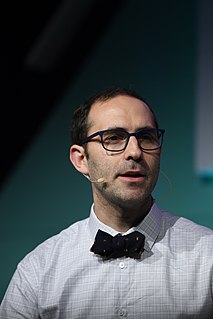A Quote by Dave Barry
In those days, most people read newspapers, whereas today, most people do not. What caused this change? One big factor, of course, is that people are a lot stupider than they used to be, although we here in the newspaper industry would never say so in print.
Related Quotes
In a print interview, as you may or may not know, they [editors] can do whatever they want. And they do. This is why most people are more hesitant to do print, because they can change it, and they do change it. They even change things that are in quotation marks, which is a pet peeve of mine. I've said to numerous reporters, "Would you read me back my direct quotes?" And they always say no. They always say that's against the policy.
Most people have some appreciation of mathematics, just as most people can enjoy a pleasant tune; and there are probably more people really interested in mathematics than in music. Appearances suggest the contrary, but there are easy explanations. Music can be used to stimulate mass emotion, while mathematics cannot; and musical incapacity is recognized (no doubt rightly) as mildly discreditable, whereas most people are so frightened of the name of mathematics that they are ready, quite unaffectedly, to exaggerate their own mathematical stupidity
As people get their opinions so largely from the newspapers they read, the corruption of the schools would not matter so much if the Press were free. But the Press is not free. As it costs at least a quarter of a million of money to establish a daily newspaper in London, the newspapers are owned by rich men. And they depend on the advertisements of other rich men. Editors and journalists who express opinions in print that are opposed to the interests of the rich are dismissed and replaced by subservient ones.
I think there's been this long cycle of the big companies making a lot of money by underestimating people's intelligence and people are used to it now. So, they're so used to having their intelligence underestimated that, for most of them, it really isn't worth the bother of paying a little more attention to something that might hit them on a deeper level. But you can't really read people's minds.
The newspaper industry when I came along in the mid-70s was rich and powerful and growing and hungry for material and open to new people. None of that is true in the newspaper industry today. Print in general is pretty rugged. The good thing is that you can gain a foothold on the Internet because everybody has access to it, even things like Twitter - I mean, you can get a reputation for being funny pretty quickly on Twitter, on a blog, that kind of thing.
[The web] is going to end up being a tremendous advantage, providing we can work out the financial structure. I think we’ll see newspapers survive, being printed at home... Or you’ll have a local print shop, so that rather than waiting for the newspapers to arrive by truck, which is 30 percent at least of a newspaper’s cost, you’ll go in and push a button, and it will take your dollar bills without anyone having to be there. And it will print the newspaper for you while you wait. It will take seven minutes. There’s a terrific future for print in my view and it gives me great heart.
My standards are higher than they used to be, I think. They don't necessarily have to make sense, but I certainly work on them a lot harder now -- partly because I do them on the computer, and I print them out and fix them, and print them and fix them over and over again, whereas in the early days I used to just scratch down a few things on a piece of paper.
This is true for most new products. The majority of people you're competing with are non-users. They are people who have never used your service before. And what they say is actually the most important. What they say is the thing that blocks you from expanding the size of your market with your features.
You don't just have people who wake up in the morning and say, "What evil things can I do today, because I'm Mr. Evil?" People do things for what they think are justified reasons. Everybody is the hero of their own story, and you have to keep that in mind. If you read a lot of history, as I do, even the worst and most monstrous people thought they were the good guys. We're all very tangled knots.































